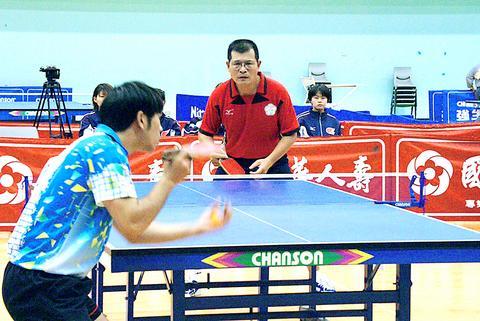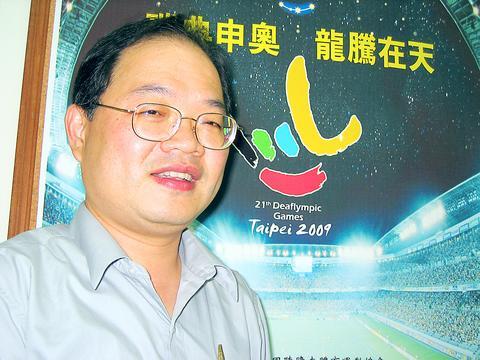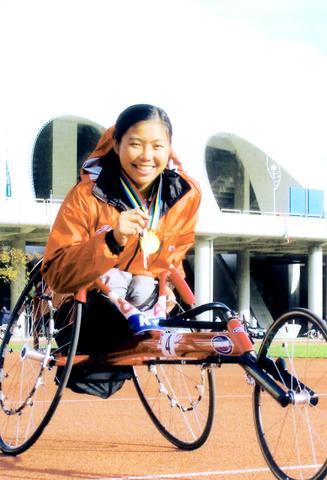While the nation's poor showing on the international sporting scene continues to flummox sports-minded folk, athletics committees could do a lot worse than look at and learn from Taiwan's special needs sports associations that constantly manage to build medal winning teams.
Whether it's a regional table tennis competition, or an international athletics meet, Chinese Taipei's paraplegic, deaf and mentally handicapped athletes rarely come home empty handed.

PHOTO COURTESY OF THE CHINESE TAIPEI SPORTS ASSOCIATION OF THE D
Since 1992 -- the year the International Olympic Committee (IOC) recognized Taiwan's handicapped sports associations -- the Chinese Taipei Sports Association of the Deaf (

PHOTO: GAVIN PHIPPS, TAIPEI TIMES
The most recent of these successes took place at the Special Olympics World Games, which were held in Dublin, Ireland, in August. A 43-member squad brought home 10 gold, 13 silver and 11 bronze medals. The team's strongest fields proved to be bocce, aquatics and bowling.
"We started a special five-stage training program a year before we left for Dublin and it certainly paid off," said James Chang (

PHOTO COURTESY OF CHINESE TAIPEI PARALYMPICS COMMITTEE
However impressive these achievements, maybe they are being overlooked. Not that this has stopped the nation's handicapped sports men and women from building up a reputation as some of the finest physically and mentally impaired athletes in the world. This is a status that, according to Lai Fau-hwan (
"The biggest problem has always been the fact that non-handicapped [Taiwanese] put far too much emphasis on being a hero and winning rather then simply participating," Lai said. "I look at it differently. It's not about winning, it's about physical well-being, enjoyment and involvement."
A graduate of Taiwan Normal University's faculty of Physical Education, Lai lost his left leg in motorcycle accident in 1979. His prosthetic limb didn't stop him becoming one of the nation's first paraplegic gold medal winners.
Lai entered the record books at the 1989 Far East and South Pacific Games for the Disabled (FESPIC) in Kobe, Japan, winning gold in the discus and javelin and silver in the shot putt. On his return to Taiwan, Lai was greeted to a hero's welcome and even honored at a special reception by then president Lee Teng-hui (李登輝).
On taking over as director of the Chinese Taipei Paralympics Committee in 1992, Lai's first task was to secure funding for the cash-strapped organization.
Although government funding was not forthcoming for the first three years of Lai's tenure, in 1995, the government finally caved in and donated NT$10million to the committee for training and education programs and travel expenses.
"It was a real fight to get the funding in the beginning. I don't think the government considered [handicapped] sports worthy of funding," said the committee director. "It's gotten a lot better. Society's opinions about us and what we can achieve, given the right support, has changed for the better."
According to Lai, since President Chen Shui-bian (陳水扁) began his term in office, acquisition of annual funds for the paralympics team has got easier. Instead of an annual budget, funding is based upon the committee's sporting calendar.
Due to its participation in the upcoming Wheelchair Games in Christchurch, New Zealand, in October, this year's budget weighed in at just over NT$20million. With the cash, Lai said he was confident Taiwan's paralympic team would continue to prove its medal winning mettle in track and field events, table tennis and power lifting.
"There might be no fixed annual budget, but the funding we do get is enough and enables us to attend more competitions, which in turn means we are in a constant state of improvement," Lai said.
Receiving slightly less funding -- roughly NT$5million per annum -- the Chinese Taipei Sports Association of the Deaf has also made its mark on the international sporting scene; athletics, aquatics and table-tennis being the three areas in which the associations excels. Deaf athletes are not permitted by IOC rules to participate in sports that involve physical contact such as judo and wrestling for safety reasons.
Deaflympic success might have eluded the team, but after participating in only three Asian Pacific Games for the Deaf since 1996 the Chinese Taipei Sports Association of the Deaf is currently lying second in the overall Asian standings. Its behemoth cross-strait rival China is third with 22 gold medals to Taiwan's 24.
"When you look at the numbers of those eligible to participate in deaf games in China for example, then Taiwan's achievement is fantastic," said Chao Yu-ping (
Along with beating China into second place in the Asian rankings, Taiwan's deaf athletes have also enjoyed the prestige of hosting the Deaflympics. In 2000 the sixth Asian Pacific Games for the Deaf was held in Taipei. The event saw Taiwan placing second to Japan by a margin of only three silver medals.
The association was recently given another boost after Taiwan won the rights to host the 2009 Deaflympics, which will be the first time the event has ever been held in an Asian country since its inception in 1924.
Although Taiwan's handicapped athletes are all amateurs, those athletes chosen to represent their country still take international competition very seriously. Along with its regular coaching sessions, the Chinese Taipei Paralympics Committee has recently taken to using sports psychologists in order to enhance performance. Also, members of the paralympic squad have been visiting the Chinese Culture University's Graduate Institute of Sport Coaching Science (
Wired up to an array of specially adapted exercise machines, faculty members such as Professor Jasson Chiang (
"We have specially adapted machines on which we can plot the handicapped athletes' physiology. With the coaches present we map out a training schedule that best suits each particular individual," said Chiang. "Unlike non-handicapped athletes, each one has his/her restrictions and own needs. We haven't been doing it long and we're still learning, but it's certainly made a difference, especially to the younger athletes."
Regardless of their physical disparities and amateur status, Taiwan's paraplegic, deaf and mentally handicapped teams haven't avoided the irksome shenanigans of Beijing that take place at international sports meets. Old rivalries still run deep, as Taiwan's paralympic team discovered nine years ago.
The slap in the face took place at the 1994 FESPIC Games in Beijing after a stadium announcer at the awards ceremony referred to Taiwan as "China Taipei" as opposed to the officially IOC recognized moniker of Chinese Taipei.
"I told them in no uncertain terms that if they didn't correct the mistake and announce [our] name in accordance with IOC rules that we would boycott the awards ceremony," said the paralympic committee director with a smirk. "Whether it was deliberate or not I don't know. They said it again properly, though and we took to the podium with the other teams."

Jacques Poissant’s suffering stopped the day he asked his daughter if it would be “cowardly to ask to be helped to die.” The retired Canadian insurance adviser was 93, and “was wasting away” after a long battle with prostate cancer. “He no longer had any zest for life,” Josee Poissant said. Last year her mother made the same choice at 96 when she realized she would not be getting out of hospital. She died surrounded by her children and their partners listening to the music she loved. “She was at peace. She sang until she went to sleep.” Josee Poissant remembers it as a beautiful

For many centuries from the medieval to the early modern era, the island port of Hirado on the northwestern tip of Kyushu in Japan was the epicenter of piracy in East Asia. From bases in Hirado the notorious wokou (倭寇) terrorized Korea and China. They raided coastal towns, carrying off people into slavery and looting everything from grain to porcelain to bells in Buddhist temples. Kyushu itself operated a thriving trade with China in sulfur, a necessary ingredient of the gunpowder that powered militaries from Europe to Japan. Over time Hirado developed into a full service stop for pirates. Booty could

Politically charged thriller One Battle After Another won six prizes, including best picture, at the British Academy Film Awards on Sunday, building momentum ahead of Hollywood’s Academy Awards next month. Blues-steeped vampire epic Sinners and gothic horror story Frankenstein won three awards each, while Shakespearean family tragedy Hamnet won two including best British film. One Battle After Another, Paul Thomas Anderson’s explosive film about a group of revolutionaries in chaotic conflict with the state, won awards for directing, adapted screenplay, cinematography and editing, as well as for Sean Penn’s supporting performance as an obsessed military officer. “This is very overwhelming and wonderful,” Anderson

Lori Sepich smoked for years and sometimes skipped taking her blood pressure medicine. But she never thought she’d have a heart attack. The possibility “just wasn’t registering with me,” said the 64-year-old from Memphis, Tennessee, who suffered two of them 13 years apart. She’s far from alone. More than 60 million women in the US live with cardiovascular disease, which includes heart disease as well as stroke, heart failure and atrial fibrillation. And despite the myth that heart attacks mostly strike men, women are vulnerable too. Overall in the US, 1 in 5 women dies of cardiovascular disease each year, 37,000 of them